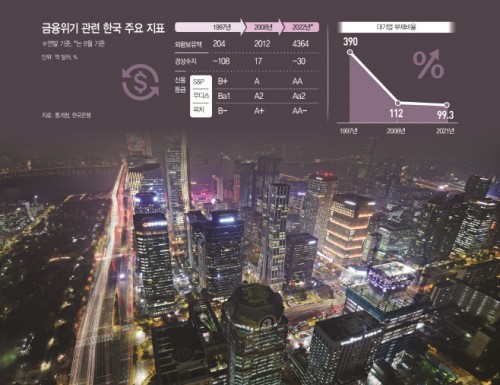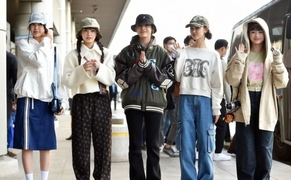 |
| The Korean economy bounced back up like a roly poly. We have turned crisis into opportunity to build fundamentals. Amid the global economic slump, the Korean economy will see new opportunities. The photo shows the night view of Yeouido stock street in Seoul. |
AsiaToday reporter Jang Soo-young
A crisis is an opportunity for some. It becomes a solid foundation for nurturing strength. The Korean economy was able to grow even stronger after the Asian financial crisis in 1997 and the global financial crisis in 2008, and companies were able to improve their fundamentals and financial soundness.
The financial crisis was also a time of new challenges for individuals. The Korean economy is now experiencing a crisis of three highs - high inflation, high exchange rate, and high interest rates. It is time to show the wisdom of seizing opportunities over crises again.
According to the National Statistical Office on Wednesday, the foreign exchange reserves of the Korean economy stood at US$436.43 billion as of August. Although the amount of foreign exchange reserves has been decreasing due to the recent surge in the dollar price, it has increased more than 20 times compared to the amount of foreign exchange reserves of US$20.4 billion during the 1997 Asian financial crisis. As of the end of August, the country’s foreign exchange reserves were ranked 8th in the world. The position is the lesson the country learned from the past.
At that time, short-term external debt had surged as general financial institutions and leasing companies supplied short-term borrowings from overseas to domestic companies in the long-term. Companies were not aware of the debt ratio due to reckless borrowings. It was a time when the debt-to-equity ratio was in the 300 to 400 percent range. Since the financial crisis, domestic companies began to recognize the importance of financial soundness and risk management. At the end of 2021, the debt-to-equity ratio of domestic conglomerates dropped significantly to 99.3 percent.
The Korean economy gained strength to overcome the crisis as it went though the foreign exchange crisis. As the importance of the dollar was emphasized, the Korea-US currency swap was first signed in 2008. At the time of the global financial crisis in 2008, Korea’s foreign exchange reserves stood at US$201.2 billion. The Korea-US currency swap served as a safety valve during the global financial crisis in 2008 and the economic crisis caused by the pandemic in 2020.
For some companies, a crisis was an opportunity. Samsung Group, under the direction of the restructuring headquarters, undertook business restructuring to manage risks during the financial crisis. Since beating Hyundai in 2001, Samsung has been maintaining its No. 1 position in the business world for over 20 years.
Those salaried employees who looked ahead to the future was no exception. Mirae Asset Financial Group Chairman Park Hyeon-joo left the securities company he had worked for and founded Mirae Asset Global Investments and Mirae Asset Capital in 1997. The following year, he launched the first retail mutual fund, “Park Hyeon Joo No.1”, which was a great success with 90% return in just one year. Celltrion Chairman Seo Jung-jin became the chairman of a global biosimilar company from an ordinary salaried worker.
Crises and opportunities go hand in hand. Now is the time for risk management and a sense of sight is needed to discover new investment opportunities.
Experts say that companies and individuals should take a preemptive response amid the economic downturn that will continue until next year. There are even opinions that it is premature to predict a financial crisis in the current situation. “The economic downturn is expected to continue until end of this year and early next year,” said Kim Heung-jong, head of the Korea Institute for International Economic Policy.
#crisis #opportunities
Copyright by Asiatoday
Most Read
-
1
-
2
-
3
-
4
-
5
-
6
-
7





















